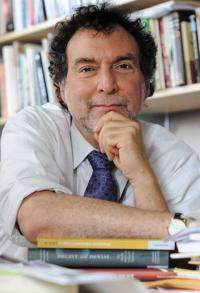David Rosner, PhD, MPH
- Ronald H. Lauterstein Professor of Sociomedical Sciences and Professor of History
On the web

Overview
David Rosner, PhD, MPH, focuses on research at the intersection of public health and social history and the politics of occupational disease and industrial pollution. He has been actively involved in lawsuits on behalf of cities, states and communities around the nation who are trying to hold the lead, asbestos and chemical industry accountable for past acts that have resulted in tremendous damage to America's children. Cases aimed at removing lead from children's environments, removing PCBs from state waterways, and asbestos suits aimed at providing funds for remediation and compensation for victims of environmental and occupational disease have grown out of his academic work. His work on the history of industry understanding the harms done by their industrial toxins has been part of law suits on behalf of asbestos workers and silicosis victims as well.
Prior to joining the Columbia faculty in 1998, Dr. Rosner was University Distinguished Professor of History at the City University of New York. In 2010, he was elected to the National Academy of Sciences' National Academy of Medicine. In addition to numerous grants, he has been a Guggenheim Fellow, a recipient of a Robert Wood Johnson Investigator Award, a National Endowment for the Humanities Fellow and a Josiah Macy Fellow. He has been awarded the Distinguished Scholar's Prize from the City University and the Viseltear Prize for Outstanding Work in the History of Public Health from the APHA, and Distinguished Alumni Award from the University of Massachusetts Department of Public Health, among others. Dr. Rosner has also been honored by the New York Committee on Occupational Safety and Health and, with Gerald Markowitz, was awarded the Rachel Carson Award and the Upton Sinclair Memorial Lectureship ""For Outstanding Occupational Health, Safety, and Environmental Journalism by the American Industrial Hygiene Association."" Dr. Rosner is an author of eleven books on occupational disease, epidemics and public health. Lead Wars: The Politics of Science and the Fate of America's Children, (University of California Press/Milbank Fund, 2013) details the recent conflicts at Johns Hopkins over studies of children placed in homes with low level lead exposure and what it says about public health research. His forthcoming work, also with Gerald Markowitz, is Building the Worlds that Kill Us (Columbia University Press, 2022).
Academic Appointments
- Ronald H. Lauterstein Professor of Sociomedical Sciences and Professor of History
Administrative Titles
- Co-Director, Center for the History & Ethics of Public Health
- Advisory Board, Center for Science and Society
- Advisory Committee, Presidential Scholars in Society and Neuroscience
Credentials & Experience
Education & Training
- MPH, 1972 University of Massachusetts
- PhD, 1978 Harvard University
Committees, Societies, Councils
Elected Member, National Academy of Medicine
APHA Governing Council, 1994-1996
Chair, Viseltear Committee, APHA Medical Care, 1991-2000
John McGovern Prize, Sigma Xi, Honorary Science Society
Contributing Editor, Public Health Reports, 2002-
Editorial Board, Journal of Public Health Policy, 1999-
Honors & Awards
RWJ Health Policy Investigator Award, 2002-2005
Arthur Viseltear Award, Medical Care Section, APHA, 2000
Guggenheim Fellow, 1987-1988
NEH Fellow, 1983-1984
Upton Sinclair Award, American Industrial Hygiene Association, 2005
Research
Human suffering, deaths and disease are emblematic of the inequities of society. Work for equality.
Selected Publications
D. Rosner and G. Markowitz, Building the Worlds that Kill Us, (Columbia University Press, forthcoming).
Markowitz G, Rosner D Deceit and Denial: The Deadly Politics of Industrial Pollution University of California Press Berkeley 2002
David Rosner and Gerald Markowitz Are We Ready? Public Health Since 9/11 University of California Press Berkeley, California, US 2006
Rosner D, ed. "Hives of Sickness": Epidemics and Public Health in New York City Rutgers University Press New Brunswick 1996
Rosner D A Once Charitable Enterprise: Hospitals and Health Care in Brooklyn and New York Cambridge University Press NY 1982;2004
Markowitz G, Rosner D Children, Race and Power: Kenneth and Mamie Clark's Northside Center Routledge NY, NY 2002
Markowitz G, Rosner D, eds. "Slaves of the Depression": Workers' Letters about Life on the Job Cornell University Press Ithaca, NY 1987
Rosner D, Markowitz G, ed. Dying for Work Indiana University Press Bloomington 1987
Rosner, D., and Markowitz, G. Deadly Dust: Silicosis and the On-Going Struggle to Protect Workers' Health, new and expanded edition. University of Michigan Press Ann Arbor, MI 2006
Reverby S, Rosner D, eds. Health Care in America: Essays in Social Medicine Temple University Press Philadelphia 1979
Global Health Activities
Lectures in UK: Dr. Rosner was a keynote speaker at an international conference on the medical humanities and ethics at the University College London . Also, he is the Edward and Amalie Kass Lecturer University College London; also lecturer, University at Exeter and Annual Lecture, London School of Tropical Medicine, 2014. He has lectured in Spain, Italy, Hungary, Germany, England, France, South Africa and other countries.
IREX Program on Eastern Europe and EHESS Program in Paris: Dr. Rosner was one of a number of historians invited to a two-week seminar with Hungarian historians. Also Visiting Faculty, Ecole des Hautes Etudes en Sciences Sociales, Paris, France and Science Po..
International Silicosis Project: This is a project on the international comparison of an occupational disease, silicosis. It is headquartered in Paris, France and grew out of a lecture Rosner gave at the Ecole des Hautes Etudes en Sciences Sociales.
Urban Health Activities
September 11th and Public Health: Dr. Rosner has organized and written reports on September 11th and its impact on public health infrastructure for the Robert Wood Johnson Foundation and Milbank Fund. The Milbank Fund published three of his special reports. His other books on Urban Health include, A Once Charitable Enterprise: Hospitals and Health Care in Brooklyn and New York (Cambridge University Press), Children, Race, and Power (University of Virginia Press and Routledge) Are We Ready: Public Health since 9/11 (University of California Press/Milbank), Hives of Sickness (Rutgers University Press), and Lead Wars (University of California Press).
Author of books on NYC : Dr. Rosner is the author of A Once Charitable Enterprise: Hospitals and Health Care in Brooklyn and New York (Cambridge University Press). Author of: Children, Race and Power, (Routledge Press) Editor of:""Hives of Sickness: Epidemics and Public Health in New York City
Television, Radio and Movie Documentaries on New York City: Dr. Rosner has been on numerous radio programs including All Things Considered, Tell me More, Radiolab, Morning Edition, Fresh Air, and other NPR and BBC broadcasts. He has also appeared in NOVA?'s documentary The Most Dangerous Woman in the World: Typhoid Mary. ABC's ""Do You Know Who You Are?""; NBCs ""Dateline;"" and other European newscasts. He was also interviewed for a Greater New York Hospital Association documentary on New York Hospitals. Also, his work and he were featured on Bill Moyers' PBS Special: ""Trade Secrets"" and an HBO special, ""Blue Vinyl.
